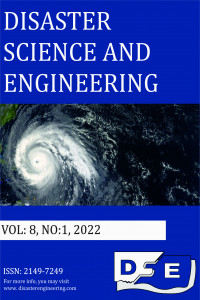Pro-Environmental Behaviors, Pollution Control Attitudes and Environmental Knowledge of Secondary School Students
Abstract
This study assessed the level of pro-environmental behaviors, pollution control attitudes and knowledge among a sample of 424 secondary school students within Abuja the capital city of Nigeria. The data for this study was collected using three tools: environmental attitude test, environmental knowledge test and pro-environmental behavioral scale. The study data were analyzed using Ms. Excel computer program. Pearson correlation coefficient was used to compare individual responses on environmental knowledge with environmental attitude to see if both responses correlate with one another. According to the study results, the environmental attitude of the students was high, and results also showed their environmental knowledge to be also high while their pro-environmental behaviors were found to be moderate. It also reviewed that female student exhibited better pro-environmental behaviors, while the male students gave a better attitude to environmental related issues. The result displayed a very strong positive correlation value of 0.807 between environmental knowledge and environmental attitude, meaning the higher the environmental knowledge, the better their attitude towards issues of the environment and vice versa.
References
- Abuja-Citiserve (2004). Estimates of Waste Generation Volumes and Income Potential in Abuja. Population Abuja (English Edition), 805:1-29.
- Adedeji Daramola & Eziyi O. Ibem (2019). Urban environmental problems in Nigeria: implications for sustainable development.
- Adeyemi O. B., (2011). Waste Management in Contemporary Nigeria: The Abuja Example.
- Akinyele.I.O et al (1994) ’Poverty reduction and urban violence: the case for street food vendors in Nigeria’, in Albert.O.I et al (Eds.)(1994) urban management and urban violence in africa. Ibadan: ifra vol 2.
- Babayemi, J. O., & Dauda, K. T. (2009). Evaluation of solid waste generation, categories and disposal options in developing countries: A case study of Nigeria.Journal of Applied Sciences and Environmental Management, 13(3), 83–88. ISSN: 1119–8362. Retrieved fromhttp://www.ajol.info/Index.php/jasem/article/viewFile/55370/43836
- Babayemi, J. O., Ogundiran M. B., and Osibanjo O., (2016). Overview of Environmental Hazards and Effects of Health Effects of Pollution in Developing Countries: a Case study of Nigeria.
- Bearer C. F., (1995). Environmental Health Hazards: How Children Are Different from Adults.
- Decamps H. (2000). Demanding more of Landscape Research (and researches) Landscape and Urban Planning. Environmental Pollution 47 105-109.
- Desrochers J. E., Albert G., Milfont T., Kelly B., and Arnocky S. (2019). Why do Women care more about the environment than Men?
- Dźwigoł H. (2018). Scientific Research Methodology in Management Sciences.
- Ibrahim F., M. and Babayemi F., O. (2010). Knowledge & Attitude of a Group of Nigerian Undergraduates Towards Environmentalism.
- Imam, A., Mohammed, B., Wilson, D.C, Cheeseman, C.R., (2008). Solid waste management in Abuja, Nigeria, Waste Management, Volume 28, Issue 2.
- Navarro f., & Vincenzo T. (2019). Waste management in developing countries: A review of global issues.
- Nnaji C.C. (2015). “Status of municipal solid waste generation and disposal in Nigeria”, Management of Environmental Quality: An International Journal, Vol. 26 Issue 1 pp. 53 – 71.
- NPC. (2012). National Population Commission Nigeria. Retrieved from www.population.gov.ng. Accessed 16th April 2012.
- Obiadi, Bons N., & Onochie, A. O. (2018). Abuja, Nigeria Urban Actors, Master Plan, Development Laws and their Roles in the Design and Shaping of Abuja Federal Territory and their Urban Environments.
- The Nigerian National Bureau of Statistics (2019). Report on poverty and inequality. United Nations Organization (1996). International Year for the Eradication of Poverty.
Abstract
References
- Abuja-Citiserve (2004). Estimates of Waste Generation Volumes and Income Potential in Abuja. Population Abuja (English Edition), 805:1-29.
- Adedeji Daramola & Eziyi O. Ibem (2019). Urban environmental problems in Nigeria: implications for sustainable development.
- Adeyemi O. B., (2011). Waste Management in Contemporary Nigeria: The Abuja Example.
- Akinyele.I.O et al (1994) ’Poverty reduction and urban violence: the case for street food vendors in Nigeria’, in Albert.O.I et al (Eds.)(1994) urban management and urban violence in africa. Ibadan: ifra vol 2.
- Babayemi, J. O., & Dauda, K. T. (2009). Evaluation of solid waste generation, categories and disposal options in developing countries: A case study of Nigeria.Journal of Applied Sciences and Environmental Management, 13(3), 83–88. ISSN: 1119–8362. Retrieved fromhttp://www.ajol.info/Index.php/jasem/article/viewFile/55370/43836
- Babayemi, J. O., Ogundiran M. B., and Osibanjo O., (2016). Overview of Environmental Hazards and Effects of Health Effects of Pollution in Developing Countries: a Case study of Nigeria.
- Bearer C. F., (1995). Environmental Health Hazards: How Children Are Different from Adults.
- Decamps H. (2000). Demanding more of Landscape Research (and researches) Landscape and Urban Planning. Environmental Pollution 47 105-109.
- Desrochers J. E., Albert G., Milfont T., Kelly B., and Arnocky S. (2019). Why do Women care more about the environment than Men?
- Dźwigoł H. (2018). Scientific Research Methodology in Management Sciences.
- Ibrahim F., M. and Babayemi F., O. (2010). Knowledge & Attitude of a Group of Nigerian Undergraduates Towards Environmentalism.
- Imam, A., Mohammed, B., Wilson, D.C, Cheeseman, C.R., (2008). Solid waste management in Abuja, Nigeria, Waste Management, Volume 28, Issue 2.
- Navarro f., & Vincenzo T. (2019). Waste management in developing countries: A review of global issues.
- Nnaji C.C. (2015). “Status of municipal solid waste generation and disposal in Nigeria”, Management of Environmental Quality: An International Journal, Vol. 26 Issue 1 pp. 53 – 71.
- NPC. (2012). National Population Commission Nigeria. Retrieved from www.population.gov.ng. Accessed 16th April 2012.
- Obiadi, Bons N., & Onochie, A. O. (2018). Abuja, Nigeria Urban Actors, Master Plan, Development Laws and their Roles in the Design and Shaping of Abuja Federal Territory and their Urban Environments.
- The Nigerian National Bureau of Statistics (2019). Report on poverty and inequality. United Nations Organization (1996). International Year for the Eradication of Poverty.
Details
| Primary Language | English |
|---|---|
| Subjects | Engineering |
| Journal Section | Articles |
| Authors | |
| Publication Date | June 29, 2022 |
| Published in Issue | Year 2022 Volume: 8 Issue: 1 |


